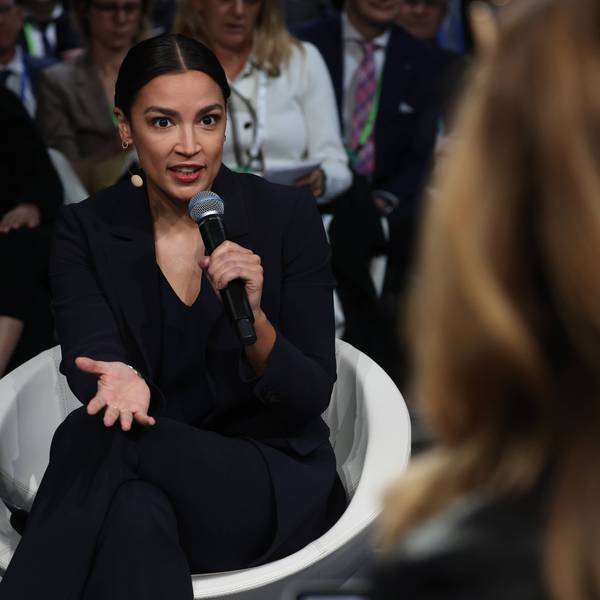Gathering for the annual World Economic Forum in the Swiss Alps town of Davos, some of the world's wealthiest business leaders and so-called "thought leaders" focused their attention Monday on a proposal that's gaining traction in the U.S.--a return to a far higher marginal tax rate for the wealthy as a way of correcting the country's widening wealth gap. A majority of American voters support the idea, a fact that was cited by one Davos attendee as precisely why he fears the proposal.
"It's scary," Scott Minerd, head of the $265 billion investment firm Guggenheim Partners, told CNBC of Rep. Alexandria Ocasio-Cortez's (D-N.Y.) proposal of a 70 percent tax rate for income over $10 million per year, predicting that the idea will likely continue to get more of the the attention it's captured over the past three weeks, since the freshman congresswoman mentioned it in an interview with "60 Minutes."
"More than 10 years after the collapse of Lehman Brothers, hostility toward the corporate elite is finally hitting the political mainstream in a meaningful way." --Lionel Laurent, Bloomberg"This is going to gain more momentum," said Minerd. "And I think the likelihood that a 70 percent tax rate, or something like that, becomes policy is actually very real."
Another attendee, Blackstone CEO Stephen Schwarzman, sarcastically told CNBC that he is "wildly enthusiastic" about the tax proposal, complaining that the U.S. already has "the second most progressive tax regime in the world."
Ocasio-Cortez herself showed little sympathy for fearful elites like Minerd and Schwarzman, tweeting her disbelief that the ultra-wealthy are publicly expressing concern over their own financial well-being while nearly half of Americans regularly struggle to afford basic monthly expenses.
Public polling shows Minerd has reason to be concerned. Since her "60 Minutes" appearance a poll found the 59 percent of Americans support a 70 percent tax rate for income above $10 million, including 45 percent of Republicans, and major TV networks have devoted more time to her idea.
On Monday, "Late Show" host Stephen Colbert invited Ocasio-Cortez to explain that a 70 percent tax rate for the richest Americans would simply be a way to correct the "excess" that the rich have been afforded in recent decades, asking Colbert's 3.6 million viewers, "What kind of society do we want to live in?"
Minerd is among those who have denounced Ocasio-Cortez as promoting an "extreme" solution, but the congresswoman's case has been supported by economists like Emmanuel Saez and Gabriel Zucman, who wrote in the New York Times Tuesday, "It's obvious that the affluent--who've seen their earnings boom since 1980 while their taxes fell can contribute more to the public coffers"--especially since they have in the past:
Sharply progressive taxation is an American invention: The United States was the first country in the world, in 1917--four years after the creation of the income tax--to impose tax rates as high as 67 percent on the highest incomes. When Representative Ocasio-Cortez proposes a 70 percent rate for incomes above $10 million, she is reconnecting with this American tradition. She's reviving an ethos that Ronald Reagan successfully repressed, but that prevailed during most of the 20th century.
Meanwhile, columnist Lionel Laurent wrote at Bloomberg that it is not high tax rates for the wealthy that seem preposterous today, but rather the annual retreat for the world's elites--especially amid mounting news of the damage that worldwide wealth inequality has done in recent years.
"The past decade and a half has seen U.S. corporate profits outgrow employee compensation at an unprecedented pace, according to the St. Louis Fed," Laurent wrote. "A Bloomberg News analysis of the fortunes of a dozen Davos attendees found that they soared by a combined $175 billion since 2009. Those feel-good panel debates on topics like 'Better Capitalism' are pretty laughable."
"More than 10 years after the collapse of Lehman Brothers, hostility toward the corporate elite is finally hitting the political mainstream in a meaningful way. Executive rewards are looking indefensible, and being a globe-trotting 'thought leader' offers no protection," he added.




